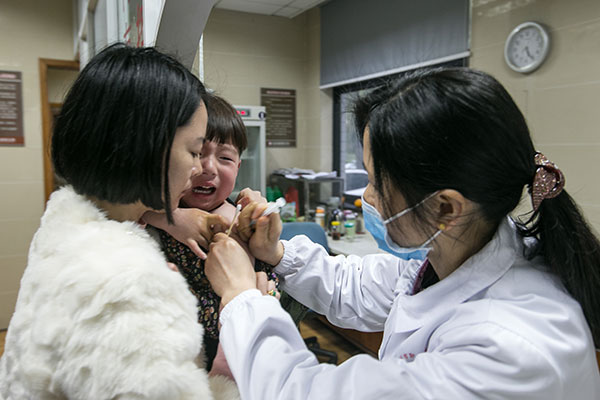Vaccines are not high-risk biological products
Updated: 2016-03-24 07:56
By Fang Xuanchang(China Daily)
|
||||||||
 |
|
A patient receives rabies vaccine injection at Hangzhou hospital, March 22. [Photo/VCG] |
The latest vaccine scandal, exposed in East China's Shandong province in early March, has generated excessive unprofessional interpretations of possible side effects, as it involves 570 million yuan ($87 million) worth of vaccines that were suspected of being sold to 24 provinces, municipalities, and autonomous regions without being kept and transported in the required refrigerated conditions.

Undoubtedly, the vaccine scandal has brought about very adverse social effects and its occurrence has underlined management and supervision loopholes in the production and use of vaccines. All involved in the scandal should be held accountable in accordance with the law. Vaccines that fail to be strictly stored and transported as required, however, are neither equivalent to "poisonous vaccines" as described by some nor will they inevitably produce the terrible consequences suggested.
The posting of previous media reports about "problem vaccines", has meant the country's drug epidemic prevention regulators have been severely criticized. However, a calm and objective look at these reports will reveal that the hazardous consequences of the "problem vaccines" were exaggerated. People with any medical knowledge will easily discern that there actually exists no links between the "problem vaccines" and the "strange diseases" the reports claimed some children had contracted as a result of being vaccinated with invalid vaccines.
The use of "problem vaccines" usually exposes the receivers to the threat of serious diseases such as rabies and tetanus as they are unaware that they are not protected, leaving them at the risk of being infected. The use of vaccines that have not been completely inactivated is also tantamount to injecting vaccine users with the corresponding pathogens, thus exposing them to the risk of infection. Aside from these consequences, the use of vaccines, either qualified or disqualified, will also possibly depend on the recipient's reaction to an injection; there is always the possibility of an adverse reaction, although this is rare.
The incidence of one to two adverse-reaction cases in every 1 million vaccinations manifestly includes not only serious allergic reactions and epidemics contraction due to the incomplete inactivation of vaccines, but also minor body reactions. It is unscientific to equate all these adverse reactions following a vaccination with the contraction of lifelong disabilities, as a 2013 Southern Metropolis Daily story, which has been widely reposted after the latest scandal, did. With such a misperception, the Southern Metropolis Daily reporter thus drew the absurd conclusion that "vaccines in themselves are a high-risk biological products". However, the fact is that vaccines produced under normal and matured procedures belong to particularly low-risk biological products.
When it comes to children, a group that's more inclined to be vaccinated, some journalists eager to make headlines are motivated to discover some "inevitable correlations" between vaccination and the diseases vaccinated children contract because of other factors. People need to have meals and drink water, but one cannot inevitably link eating and drinking to some diseases they suffer due to other causes.
Any irresponsible media reports about vaccines will aggravate public fears over possible adverse consequences, which may directly reduce people's willingness to have their children vaccinated and thus expose them to the tangible threat of various epidemics.
The author is a Beijing-based senior science reporter.
- Chinese drug regulator vows to fix vaccine distribution loopholes
- Stars call for thorough investigation into vaccine scandal
- Premier vows no leniency in vaccine scandal
- Supreme procuratorate to supervise handling of vaccine case
- $88m vaccine sales case triggers probe
- No more side effects caused by illegal vaccines detected: Official
- Expired vaccines bear little risk of toxic effect: WHO
- Shandong reveals list of problematic vaccines
- Hundreds of suspects involving illegal sales of vaccines revealed
- Global health entering new era: WHO chief
- Brazil's planning minister steps aside after recordings revelation
- Vietnam, US adopt joint statement on advancing comprehensive partnership
- European border closures 'inhumane': UN refugee agency
- Japan's foreign minister calls A-bombings extremely regrettable
- Fukushima impact unprecedented for oceans: US expert

 Stars of Lijiang River: Elderly brothers with white beards
Stars of Lijiang River: Elderly brothers with white beards
 Wealthy Chinese children paying money to learn British manners
Wealthy Chinese children paying money to learn British manners
 Military-style wedding: Fighter jets, grooms in dashing uniforms
Military-style wedding: Fighter jets, grooms in dashing uniforms
 Striking photos around the world: May 16 - May 22
Striking photos around the world: May 16 - May 22
 Robots help elderly in nursing home in east China
Robots help elderly in nursing home in east China
 Hanging in the air: Chongqing holds rescue drill
Hanging in the air: Chongqing holds rescue drill
 2.1-ton tofu finishes in two hours in central China
2.1-ton tofu finishes in two hours in central China
 Six things you may not know about Grain Buds
Six things you may not know about Grain Buds
Most Viewed
Editor's Picks

|

|

|

|

|

|
Today's Top News
Liang avoids jail in shooting death
China's finance minister addresses ratings downgrade
Duke alumni visit Chinese Embassy
Marriott unlikely to top Anbang offer for Starwood: Observers
Chinese biopharma debuts on Nasdaq
What ends Jeb Bush's White House hopes
Investigation for Nicolas's campaign
Will US-ASEAN meeting be good for region?
US Weekly

|

|









